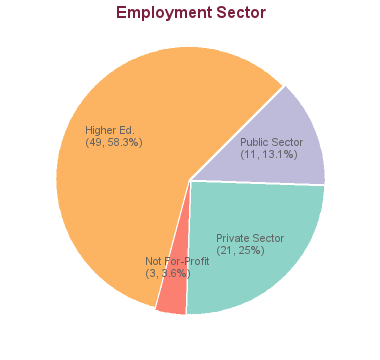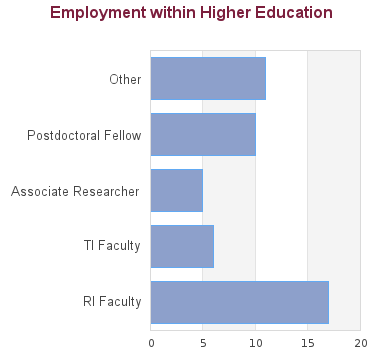Tamara Bodnar
Job Title
Postdoctoral Fellow
Employer
The University of British Columbia

Review details about the recently announced changes to study and work permits that apply to master’s and doctoral degree students. Read more
The Graduate Program in Neuroscience strives to educate and support graduate students as they expand the breadth and depth of their knowledge about the brain through enriching research experiences. The program embraces principles of equity, diversity and inclusion and recognizes and accommodates individual needs and academic backgrounds. Through two core courses on molecular/cellular and systems neuroscience, respectively, students in the program develop a broadly based and applicable neuroscientific knowledge base. Additional related courses are available for selection by the student and their supervisor. The program is research-oriented and students engage in research from the start of their studies. Research is undertaken in the laboratory of the supervisor and in their affiliated home department, over a wide range of basic and clinical neuroscience topics. With its inter-departmental structure, the program offers collaborative research opportunities that extend beyond the usual boundaries of neuroscience.
The Graduate Program in Neuroscience is a multidisciplinary program administered under the Faculty of Medicine and the Djavad Mowafaghian Centre for Brain Health at the University of British Columbia. It offers a coordinated program of graduate studies leading to MSc and PhD degrees in Neuroscience. The objective of the program is to educate graduate students as neuroscientists with intensive experience in at least one area of research, and to ensure that students in the program develop a broadly based knowledge of the neurosciences.
The program is comprised of more than 120 faculty members representing 20+ departments from the Faculties of Medicine, Science, and Arts at the University of British Columbia. Laboratory and teaching areas are located across the UBC campus, at UBC Hospital and Vancouver General Hospital.
Our faculty have research collaborations that span across departments, industries, and international borders. Although the program is inter-departmental, various regular seminars, journal clubs, and invited lectures provide ample opportunity to meet and discuss current topics in neuroscience. The program encourages its graduate students to participate in the many academic and social events organized by the Djavad Mowafaghian Centre for Brain Health and by the program’s student association.
The Faculty of Graduate and Postdoctoral Studies establishes the minimum admission requirements common to all applicants, usually a minimum overall average in the B+ range (76% at UBC). The graduate program that you are applying to may have additional requirements. Please review the specific requirements for applicants with credentials from institutions in:
Each program may set higher academic minimum requirements. Please review the program website carefully to understand the program requirements. Meeting the minimum requirements does not guarantee admission as it is a competitive process.
Applicants from a university outside Canada in which English is not the primary language of instruction must provide results of an English language proficiency examination as part of their application. Tests must have been taken within the last 24 months at the time of submission of your application.
Minimum requirements for the two most common English language proficiency tests to apply to this program are listed below:
Overall score requirement: 100
Reading
22
Writing
21
Speaking
21
Listening
22
Overall score requirement: 7.0
Reading
6.5
Writing
6.5
Speaking
6.5
Listening
6.5
Some programs require additional test scores such as the Graduate Record Examination (GRE) or the Graduate Management Test (GMAT). The requirements for this program are:
The GRE is not required.
All applicants have to submit transcripts from all past post-secondary study. Document submission requirements depend on whether your institution of study is within Canada or outside of Canada.
A minimum of two references are required for application to graduate programs at UBC. Each graduate program determines the type of reference (e.g. academic, professional) and number of references they require which can range from 2 to 4. References should be requested from individuals who are prepared to provide a report on your qualifications for the program.
Many programs require a statement of interest, sometimes called a "statement of intent", "description of research interests" or something similar.
Students in research-based programs usually require a faculty member to function as their thesis supervisor. Please follow the instructions provided by each program whether applicants should contact faculty members.
Whereas a commitment from a supervisor is not required prior to applying to the program, a supervisor is required for admission. Please view Graduate Program in Neuroscience faculty here: https://neuroscience.ubc.ca/faculty/. When contacting potential supervisors, we recommend including a CV, unofficial academic transcript, and a brief and specific explanation of why you are interested in joining that particular lab.
Permanent Residents of Canada must provide a clear photocopy of both sides of the Permanent Resident card.
All applicants must complete an online application form and pay the application fee to be considered for admission to UBC.
With more than 155,000 square feet of space, the Djavad Mowafaghian Centre for Brain Health has both laboratory and clinical research areas within the Centre proper and in the UBC Hospital Koerner Pavilion. Our core facilities are essential to ongoing collaboration, teaching, and research.
| Fees | Canadian Citizen / Permanent Resident / Refugee / Diplomat | International |
|---|---|---|
| Application Fee | $116.25 | $168.25 |
| Tuition * | ||
| Installments per year | 3 | 3 |
| Tuition per installment | $1,875.34 | $3,294.66 |
| Tuition per year (plus annual increase, usually 2%-5%) | $5,626.02 | $9,883.98 |
| Int. Tuition Award (ITA) per year (if eligible) | $3,200.00 (-) | |
| Other Fees and Costs | ||
| Student Fees (yearly) | $1,144.10 (approx.) | |
| Costs of living | Estimate your costs of living with our interactive tool in order to start developing a financial plan for your graduate studies. | |
Applicants to UBC have access to a variety of funding options, including merit-based (i.e. based on your academic performance) and need-based (i.e. based on your financial situation) opportunities.
There is a minimum funding stipend provided by each supervisor. For more information, please visit Minimum Funding for Students. For both MSc and PhD students, the Department follows a minimum funding support guideline. For PhD students, starting September 2025, the stipend will be $35,000 in year 1, $37,500 in year 2, and $40,000 annually in years 3 and 4. For MSc students, the stipend is $26,000 for year 1 and $30,000 for year 2. This stipend can come in any form (for example – scholarship, TA-ship, grant funding, or a combination).
This results in a net balance (any funding provided to the student minus tuition and fees) mean of $35,269 and median of $35,255.
All applicants are encouraged to review the awards listing to identify potential opportunities to fund their graduate education. The database lists merit-based scholarships and awards and allows for filtering by various criteria, such as domestic vs. international or degree level.
Many professors are able to provide Research Assistantships (GRA) from their research grants to support full-time graduate students studying under their supervision. The duties constitute part of the student's graduate degree requirements. A Graduate Research Assistantship is considered a form of fellowship for a period of graduate study and is therefore not covered by a collective agreement. Stipends vary widely, and are dependent on the field of study and the type of research grant from which the assistantship is being funded.
Graduate programs may have Teaching Assistantships available for registered full-time graduate students. Full teaching assistantships involve 12 hours work per week in preparation, lecturing, or laboratory instruction although many graduate programs offer partial TA appointments at less than 12 hours per week. Teaching assistantship rates are set by collective bargaining between the University and the Teaching Assistants' Union.
Academic Assistantships are employment opportunities to perform work that is relevant to the university or to an individual faculty member, but not to support the student’s graduate research and thesis. Wages are considered regular earnings and when paid monthly, include vacation pay.
Canadian and US applicants may qualify for governmental loans to finance their studies. Please review eligibility and types of loans.
All students may be able to access private sector or bank loans.
Many foreign governments provide support to their citizens in pursuing education abroad. International applicants should check the various governmental resources in their home country, such as the Department of Education, for available scholarships.
The possibility to pursue work to supplement income may depend on the demands the program has on students. It should be carefully weighed if work leads to prolonged program durations or whether work placements can be meaningfully embedded into a program.
International students enrolled as full-time students with a valid study permit can work on campus for unlimited hours and work off-campus for no more than 24 hours a week during academic sessions.
A good starting point to explore student jobs is the UBC Work Learn program or a Co-Op placement.
Students with taxable income in Canada may be able to claim federal or provincial tax credits.
Canadian residents with RRSP accounts may be able to use the Lifelong Learning Plan (LLP) which allows students to withdraw amounts from their registered retirement savings plan (RRSPs) to finance full-time training or education for themselves or their partner.
Please review Filing taxes in Canada on the student services website for more information.
Applicants have access to the cost estimator to develop a financial plan that takes into account various income sources and expenses.
92 students graduated between 2005 and 2013: 2 are in non-salaried situations; for 6 we have no data (based on research conducted between Feb-May 2016). For the remaining 84 graduates:


The 6-7 year PhD in Neuroscience is designed to prepare students for employment in the public or private sector, or to pursue further studies in the PhD program. Recent graduates have taken positions at Johnson & Johnson, AstraZeneca, Weston Brain Institute, BC Cancer Center, Science World and many other organizations. Those looking to pursue a postdoc in Neuroscience have gone on to study at other universities such as McGill as well as our own PhD program.
These statistics show data for the Doctor of Philosophy in Neuroscience (PhD). Data are separated for each degree program combination. You may view data for other degree options in the respective program profile.
| 2023 | 2022 | 2021 | 2020 | 2019 | |
|---|---|---|---|---|---|
| Applications | 58 | 58 | 53 | 43 | 40 |
| Offers | 11 | 12 | 12 | 13 | 9 |
| New Enrolment | 9 | 8 | 10 | 10 | 6 |
| Total Enrolment | 81 | 88 | 76 | 68 | 64 |
Students in research-based programs usually require a faculty member to function as their thesis supervisor. Please follow the instructions provided by each program whether applicants should contact faculty members.
Whereas a commitment from a supervisor is not required prior to applying to the program, a supervisor is required for admission. Please view Graduate Program in Neuroscience faculty here: https://neuroscience.ubc.ca/faculty/. When contacting potential supervisors, we recommend including a CV, unofficial academic transcript, and a brief and specific explanation of why you are interested in joining that particular lab.
These videos contain some general advice from faculty across UBC on finding and reaching out to a supervisor. They are not program specific.
This list shows faculty members with full supervisory privileges who are affiliated with this program. It is not a comprehensive list of all potential supervisors as faculty from other programs or faculty members without full supervisory privileges can request approvals to supervise graduate students in this program.
Neuroscience offers these core courses: Neuroanatomy, Neurophysiology, Neurochemistry, Psychobiology, Molecular Neurobiology, and Neuropharmacology.
Departments/Programs may update graduate degree program details through the Faculty & Staff portal. To update contact details for application inquiries, please use this form.
